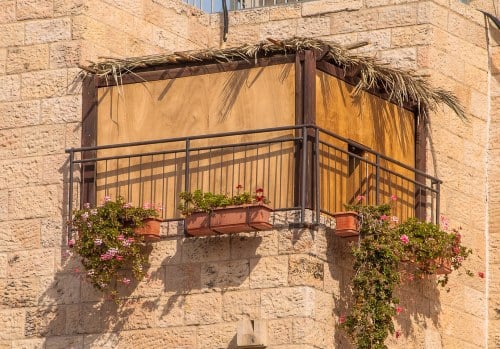
A sukkah on an outdoor balcony – courtesy of Chabad.org
‘You shall dwell in Sukkahs for seven days’ (Vayikra 23:42). What is the reason behind this mitzvah? Why do we leave our comfortable houses and live in wooden booths for a week? Chazal brings two opinions (Sukkah 11b). Rabbi Eliezer holds that we commemorate the fact that Klal Yisrael were surrounded by the ananai hacavod (clouds of glory) in the wilderness, affording them a special Divine protection. However, Rabbi Akiva holds that we read the verse literally and we remember the fact that Klal Yisrael dwelled in booths.
However, according to Rabbi Akiva, why do we have a chag for all generations to commemorate this? Surely the fact they dwelled in wooden huts isn’t as supernatural as the fact that they were surrounded by ananei hacavod, giving them protection from the elements, dangerous animals and enemy nations. Why do we need to leave our houses each year to remember that Klal Yisrael lived in huts in the desert?
The Rashbam explains that it is essential that we express our gratitude for the fact that Klal Yisrael were able to have shelter over their heads, especially in such a barren wasteland. Therefore, we leave our comfortable homes and live in a wooden booth for a week, displaying how appreciative we are that we have a roof over our heads! This helps us appreciate our homes and everything we have, leading us to internalize how it is solely due to Hashem’s great kindness.
It is a phenomenon that the things we need the most, we take for granted the most, such as air, water and shelter. Sukkos shows us how everything we have is a gift and nothing should be taken for granted. After all, we cannot begin to describe the discomfort of living without shelter. When we focus on our constant blessings and strive for them not to go unnoticed, we will live a life of unrestricted happiness, as we see in the following story.
A man spent a long time planning a holiday. Things in his life were very stressful and he just needed to unwind for a few days. However, when he arrived it was raining for five days straight, and he wasn’t able to go to enjoyable parks or relax outdoors. This must have been very disappointing, yet he resolved to remain positive and used the time to focus on all the good in His life. He thought about how fortunate he was to have a roof over his head, and what an enormous gift this was, how would he manage without shelter? Also, he took this time to appreciate the fact he had food, drink, family, friends, how he could breathe and see, the list went on and on. He focused on all his blessings in his life, due to Hashem’s great love and Mercy. He said that this was the most enjoyable holiday he ever had.
Not only is the purpose of the mitzvah of Sukkah to express our appreciation to Hashem, but this is also the purpose of the arbah minim. The Midrash explains that after being forgiven on Yom Kippur, Klal Yisrael are so full of simchah for this priceless opportunity¸ that we take our arbah minim as a way of expressing our gratitude to Hashem. Our Sages teach that by shaking our arbah minim in all four directions, we are acknowledging the fact that really everything belongs to Him. Hashem is in control of every aspect of our lives and in His great mercy He is constantly protecting us from harm and bestowing us with goodness. Shaking our arbah minim in each direction is a great expression of this.
Rabbi Avigdor Miller notes that each time we shake the arbah minim we bring it back towards us. He explains that this is symbolic of the fact that when we express our thanks to Hashem, we receive more in return! Through expressing our heartfelt appreciation to Hashem through the mitzvos of Sukkah and arbah minim, it is incomprehensible how much we can gain. This fascinating story is but one example.
A Jew who lived in a skyscraper in Manhattan really wanted to fulfill the mitzvah of dwelling in the Sukkah, but didn’t seem to have much of an option of where to build it. He decided to ask the owner of the building if he could put it on the roof and he will go all the way up there to fulfill this mitzvah. However, the owner wasn’t keen on just letting him use it like that and instead asked for a hefty fee to rent out part of the roof to him for a week. What’s more, he insisted that a contract be signed in front of a lawyer.
The Jew was a bit surprised that he was acting this way, no one used that area of the roof and it was only for a few days; yet he was determined to fulfill this precious mitzvah, so he agreed.
It turned out that the area he rented was completely abandoned and there was years’ worth of junk that he had to tidy. Out of the corner of his eye he noticed something protruding out of an old pipe. Upon closer inspection he realized that there was a bag and when he opened it, was shocked to see that it contained very valuable looking diamonds! Immediately he told the police about this find, in order that they could locate its rightful owner.
After a few days, they told him that the original owner had passed away so since he found it, he got to keep it. The owner of the skyscraper was furious. ‘I own this building’ he screamed, ‘it was on my roof so the diamonds are rightfully mine!’ After the matter went to court, the judge ruled that since the roof was legally lent out with a contract and a lawyer, the Jew got to keep it since it was currently on his property. The power of the mitzvah of Sukkah! May we be zocheh (merit) to make the most of this chag, thanking Hashem for His countless blessings.
Wishing everyone a Chag Sameach.
